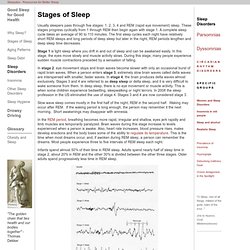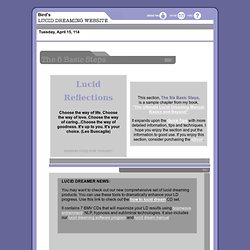

Hypnagogia and Hypnopompia. Hypnagogia is the imagery, sounds and strange bodily feelings that are felt at “sleep onset.”

This is a simplification though, as researchers have noted hypnagogic imagery in the lab at periods of quiet wakefulness as well as stage 1 sleep. Others have correlated hypnagogia with pre-sleep alpha waves and also REM intrusion into sleep onset. The truth is that the wake-sleep transition is still not understood. And neither are its trippy visuals. whispy lights, multi-dimentional geometric objects, or a sudden image like a stranger’s face Few people remember hypnagogic imagery. Strange noises, voices and rushing sounds are typical, as well as weird mechanistic sounds like beeps and boops. Some hear music — I personally have had lucid hypnagogic orchestras from time to time, with the ability to listen passively or focus on a particular instrument to induce a solo. Entoptica - by Ryan Hurd, 2005, acrylic: inspired by my hypnagogic imagery Some people are haunted by the hypnagogic imagery.
Why do we dream. The human brain is a mysterious little ball of gray matter.

After all these years, researchers are still baffled by many aspects of how and why it operates like it does. Scientists have been performing sleep and dream studies for decades now, and we still aren't 100 percent sure about the function of sleep, or exactly how and why we dream. We do know that our dream cycle is typically most abundant and best remembered during the REM stage of sleep. It's also pretty commonly accepted among the scientific community that we all dream, though the frequency in which dreams are remembered varies from person to person. The question of whether dreams actually have a physiological, biological or psychological function has yet to be answered. It's not just a stab in the dark though -- there is some research to back up the ideas that dreams are tied to how we form memories. How Dreams Work" Our dreams combine verbal, visual and emotional stimuli into a sometimes broken, nonsensical but often entertaining story line.

We can sometimes even solve problems in our sleep. Or can we? Many experts disagree on exactly what the purpose of our dreams might be. Brain Chemicals That Cause Sleep Paralysis Discovered. During the most dream-filled phase of sleep, our muscles become paralyzed, preventing the body from acting out what's going on in the brain. Now, researchers have discovered the brain chemicals that keep the body still in sleep. The findings could be helpful for treating sleep disorders, the scientists report Wednesday (July 18) in The Journal of Neuroscience. The brain chemicals kick into action during rapid eye movement (REM) sleep, a phase that usually begins about 90 minutes into a night's rest. Understanding Sleep: Deep Sleep, REM Sleep, Cycles, Stages, and. The power of sleep Many of us try to sleep as little as possible.

There are so many things that seem more interesting or important than getting a few more hours of sleep, but just as exercise and nutrition are essential for optimal health and happiness, so is sleep. The quality of your sleep directly affects the quality of your waking life, including your mental sharpness, productivity, emotional balance, creativity, physical vitality, and even your weight. No other activity delivers so many benefits with so little effort! Stages of Sleep. Usually sleepers pass through five stages: 1, 2, 3, 4 and REM (rapid eye movement) sleep.

These stages progress cyclically from 1 through REM then begin again with stage 1. A complete sleep cycle takes an average of 90 to 110 minutes. Symbols. Spaces Within Dreams. 15 Interesting Facts about Dreams. Dreaming is one of the most mysterious and interesting experiences in our lives. During the Roman Era some dreams were even submitted to the Roman Senate for analysis and dream interpretation. They were thought to be messages from the gods. Dream interpreters even accompanied military leaders into battles and campaigns! In addition to this, it is also known that many artists have received their creative ideas from their dreams. But what do we actually know about dreams?
Here are 15 interesting facts about dreams – enjoy and what’s most important, don’t forget to share your dream stories in the comment section! 1. Within 5 minutes of waking half of your dream is forgotten. 2. People who became blind after birth can see images in their dreams. 3. Every human being dreams (except in cases of extreme psychological disorder). 4. Our mind is not inventing faces – in our dreams we see real faces of real people that we have seen during our life but may not know or remember. 5. 6. People Can Learn New Skills While They Dream, Scientists Say.
Lucid Dreaming Tips - How to Lucid Dream - Tips for Lucid Dreaming / Lucid Dreams. The Six Basic Steps There are many techniques and methods that you can use for inducing lucid dreams, but there is an underlying process behind most, if not all of them.

I have broken this underlying process down into six basic steps to serve as a foundation for your lucid dream training. Once you absorb these steps and start following them, it is only a matter of time before you have your first lucid dream. In case you are wondering how long it will take for you to have your first one, just follow through with the steps and have faith that you will have one. Statistically, the time it takes for someone to have their first lucid dream averages from three weeks to two months, but yours may be tonight, but don't be discouraged if you try for a while and don't succeed. 1) Doing the Mental Prep-Work 2) Increasing dream recall.
The Fastest Way To Have Lucid Dreams & OBEs Tonight - Tim... - a Σχολειο video.